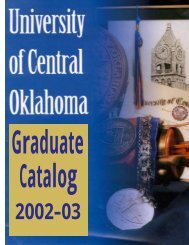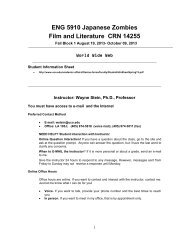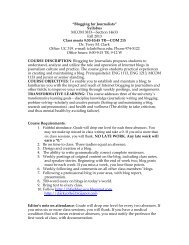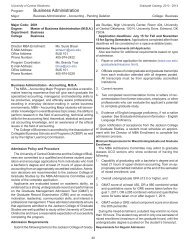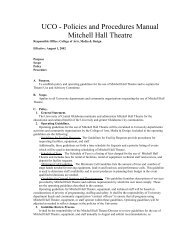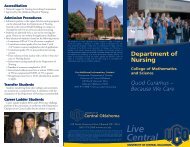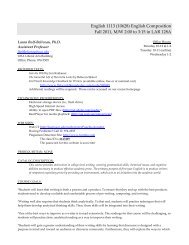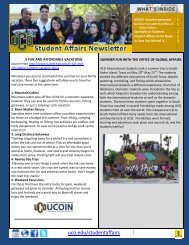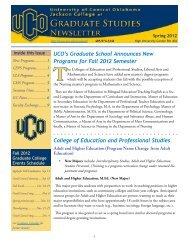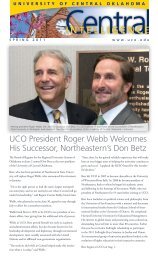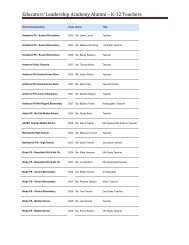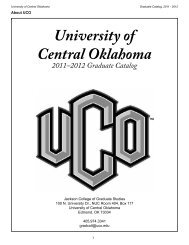Graduate Catalog - University of Central Oklahoma
Graduate Catalog - University of Central Oklahoma
Graduate Catalog - University of Central Oklahoma
Create successful ePaper yourself
Turn your PDF publications into a flip-book with our unique Google optimized e-Paper software.
<strong>University</strong> <strong>of</strong> <strong>Central</strong> <strong>Oklahoma</strong><br />
<strong>Graduate</strong> <strong>Catalog</strong>, 2012 - 2013<br />
<strong>Graduate</strong> Course Descriptions<br />
FORENSIC SCIENCES (FRSC)<br />
Forensic Science Institute<br />
FRSC 5043 - Crime Scene Processing<br />
Crime Scene Processing serves as a comprehensive review <strong>of</strong> all<br />
aspects <strong>of</strong> evidence collection and preservation. Students will learn<br />
the process <strong>of</strong> crime scene management and become pr<strong>of</strong>icient in<br />
recognizing evidence and determining proper packaging and preservation<br />
methods. Basic methods in crime scene photography, sketching,<br />
and documentation will be explored. Students will demonstrate and<br />
enhance their understanding <strong>of</strong> lecture material through participation<br />
in practical crime scene exercises. Prerequisites(s): FRSC 2503.<br />
FRSC 5143 - Crime Scene Reconstruction<br />
Crime Scene Reconstruction serves as a comprehensive overview<br />
<strong>of</strong> computer-based and remote sensing technologies in crime scene<br />
reconstruction. The focus <strong>of</strong> this crime scene course is on the use <strong>of</strong><br />
computer-based, automated data collection, reconstruction, analysis,<br />
and courtroom presentation technologies. Students will demonstrate<br />
and enhance their understanding <strong>of</strong> lecture material through participation<br />
in practical crime scene exercises. Prerequisite(s): FRSC 2503;<br />
FRSC 4043 or FRSC 5043.<br />
FRSC 5253 - Forensic Science Analysis & Lab<br />
Forensic Science Analysis serves as an introduction to classical and<br />
modern forensic science techniques with emphasis on the theory<br />
<strong>of</strong> modern impression evidence examinations. Techniques covered<br />
include latent fingerprints, handwriting and related document examinations,<br />
firearms and toolmarks, and fracture glass examinations.<br />
Automated evidence database applications are discussed and practiced.<br />
Emphasis is given to quality control and quality assurance as<br />
practiced in today’s crime laboratories. Prerequisite(s): FRSC 2503.<br />
Concurrent enrollment in FRSC 5253L required.<br />
FRSC 5253L - Forensic Science Analysis Lab<br />
This is the laboratory course that accompanies FRSC 5253.<br />
Prerequisite(s): FRSC 2503. Concurrent enrollment in FRSC 5253<br />
required.<br />
FRSC 5263 - Forensic and Biological Anthropology<br />
This course serves as a complete study <strong>of</strong> the human skeletal system<br />
and how it is used to determine individual identity using age, sex,<br />
stature, and population affinity. The student will examine the process<br />
<strong>of</strong> death through decomposition and identification. There is a field<br />
component which details the taphonomic process and collection <strong>of</strong><br />
skeletal material. The graduate level requires the student to direct<br />
a team in field work and lead that team in group presentations.<br />
Prerequisite(s): FRSC 2503 and (BIO 2504 or FNRL 2214/2214L<br />
or equivalent).<br />
FRSC 5303 - Forensic Archaeology<br />
This course is an introduction to traditional archaeological methods<br />
and how those methods are then used in a forensic setting primarily<br />
for the collection and preservation <strong>of</strong> evidence. This will include basic<br />
skeletal biology and the taphonomic process. Emphasis is given to<br />
classical methods <strong>of</strong> searching and gridding before modern electronic<br />
methods are taught. The student will, while working in groups, complete<br />
an exhumation <strong>of</strong> a carcass in the field component <strong>of</strong> the course. The<br />
graduate level requires the student to direct a team in field work and<br />
lead that team in group presentations. Prerequisite(s): FRSC 2503.<br />
FRSC 5313 - Forensic Pathology<br />
Forensic Pathology serves as a comprehensive study <strong>of</strong> multidisciplinary<br />
scientific principles and techniques which comprise the<br />
modern basis in human death investigation. Emphasis is placed on<br />
forensic pathology and odontology <strong>of</strong> human remains. Prerequisite(s):<br />
FRSC 2503.<br />
FRSC 5323 - Forensic Toxicology & Lab<br />
Forensic Toxicology serves as a “hands-on” introduction to modern<br />
toxicological methods in forensic science. Topics and analytical techniques<br />
covered include sampling preparation, instrumentation, and<br />
the analyses <strong>of</strong> alcohol, drugs <strong>of</strong> abuse, therapeutic drugs, carbon<br />
monoxide, and cyanide in biological fluids and tissues. Prerequisite(s):<br />
FRSC 2503 and CHEM 3454. Concurrent enrollment in FRSC 5323L<br />
is required.<br />
FRSC 5323L - Forensic Toxicology Laboratory<br />
This laboratory course accompanies FRSC 5323. Prerequisite(s):<br />
FRSC 2503 and CHEM 3454. Concurrent enrollment in FRSC 5323<br />
is required.<br />
FRSC 5333 - Forensic Molecular Biology & Lab<br />
This lecture and laboratory course presents advanced principles <strong>of</strong><br />
serology and DNA identification techniques with forensic laboratory<br />
applications. This course includes the theory and practice <strong>of</strong> techniques<br />
used to identify and individualize biological samples having<br />
a forensic interest. Related database applications are discussed and<br />
practiced. Emphasis is given to quality control and quality assurance<br />
as practiced in today’s crime laboratory. Prerequisite(s): BIO 3304.<br />
Concurrent enrollment in FRSC 5333L is required.<br />
FRSC 5333L - Forensic Molecular Biology Lab<br />
This course is a laboratory course designed to accompany FRSC<br />
5333. Prerequisite(s): BIO 3304. Concurrent enrollment in FRSC<br />
5333 is required.<br />
FRSC 5343 - Forensic Serology & Laboratory<br />
Forensic Serology is structured to provide advanced concepts <strong>of</strong><br />
serological techniques as it applies to the collection, preservation<br />
and examination <strong>of</strong> biological evidence. This course includes the<br />
theory and practice <strong>of</strong> techniques used to identify and individualize<br />
biological samples having a forensic interest. Emphasis is given<br />
to quality control quality assurance as practiced in today’s crime<br />
laboratory. Prerequisite(s): FRSC 2503. Concurrent enrollment in<br />
FRSC 5343L is required.<br />
FRSC 5343L - Forensic Serology Lab<br />
FRSC 5343L is the laboratory course that accompanies FRSC 5343<br />
Forensic Serology and Laboratory. Prerequisite(s): FRSC 2503.<br />
Concurrent enrollment in FRSC 5343 is required.<br />
FRSC 5353 - Firearm and Toolmark Analysis<br />
Firearm & Toolmark Analysis allows students to gain a general<br />
understanding <strong>of</strong> basic firearm and toolmark techniques and carry<br />
out practical laboratory assignments under the supervision <strong>of</strong> the<br />
instructor. Students will receive instruction and hands-on experience<br />
with firearms (rendered safe), ammunition components, toolmark<br />
samples, serial number restorative techniques, and cartridge care/<br />
projectile macroscopic analysis. Prerequisite(s): FRSC 4253 or 5253.<br />
FRSC 5413 - Bloodstain Pattern Analysis<br />
Bloodstain Pattern Analysis investigates the significance <strong>of</strong> bloodstain<br />
patterns found at violent crime scenes. Using bloodstain pattern<br />
analysis the student will learn to identify the occurrences that took<br />
place during and after a violent attack. Several practical exercises<br />
are used to assess the skill and knowledge <strong>of</strong> the student. Students<br />
will demonstrate and enhance their understanding <strong>of</strong> lecture material<br />
through participation in actual practical mock crime scene exercises.<br />
Prerequisite(s): FRSC 4043 or FRSC 5043.<br />
224



